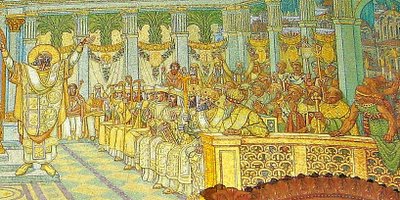Thanksgiving for our Common Faith

In his encyclical Ut Unum Sint, Pope John Paul II writes: "With regard to other Christians, to the great Christian family, [Pope John XXIII] observed: 'What unites us is much greater than what divides us'." This is true so long as there is a fundamental Credo to which all good Christians can be said to adhere. As such, when certain ecclesial communities signal a break with 'traditional' Christian beliefs and values or when liberal theology calls into doubt and even denies Credal statements, they weaken our common Christian bonds and deeply injure the unity of the Church, the Body of Christ; there comes a point when the religion professed by some just can no longer be called Christian in any real sense, let alone of any Christian denomination.
It is a sad fact that some who would like to be called Christians would also like to compromise the Truth of the faith with the zeitgeist, or who relativize and dilute the faith, demythologizing and reducing it to a socio-moral system and who explain away every element of the super-natural. Thus Pope John Paul II explained in 1995, "It is not a question of altering the deposit of faith, changing the meaning of dogmas, eliminating essential words from them, accommodating truth to the preferences of a particular age, or suppressing certain articles of the Creed under the false pretext that they are no longer understood today. The unity willed by God can be attained only by the adherence of all to the content of revealed faith in its entirety. In matters of faith, compromise is in contradiction with God who is Truth."
Therefore, there is a core of Christian faith which both parties must hold in order for Christian ecumenical dialogue to proceed at all. When ecclesial communities and individuals veer toward relinquishing such core beliefs, they also relinquish any hope of ecumenical unity for they have set themselves outside the faith of the Church and the Gospel given us by the apostles of Jesus Christ. In that case, the matter is no longer one of ecumenism but something more akin to inter-religious dialogue and re-evangelization!
As Hans Urs von Balthasar wrote in 'You Crown the Year with Your Goodness':
"A real uniting of denominations can only take place from the very kernal of faith. Provided this kernal has been guaranteed intact by each side, the dependent layers, the flesh, so to speak, can wrap around it, and agreements can be sought at these levels also. But there can be absolutely no progress on the opposite path, that is, unity in relatively secondary matters while bracketing out the primary issue. Uniting one watered-down version with another will never produce something fresh, vigourous and radiant - and this is what Christianity must be..."
But for the vast majority of Christians who adhere to the faith of the apostles and to the "very kernal of faith", these words of the late Holy Father ring true: "the Second Vatican Council for its part exhorts 'all Christ's faithful to remember that the more purely they strive to live according to the Gospel, the more they are fostering and even practicing Christian unity'." In a sense, such a Christ-centred life can be said to be eucharistic and so, a bond of unity.
As such, Balthasar continues:
"Christianity is the religion of thanksgiving. We give thanks not only for existing, for having been created, but also for being reconciled with God without any merit on our part. We gratefully accept this gift of reconciliation and try, by our lives, to help others to grasp it. If we do this, we shall have taken the most important ecumenical step together. All the questions that still separate us will be seen and solved in the light of this thanksgiving. In conclusion let us ask God:
Lord, let us never forget that we owe everything to you, the triune God, who has perfected the work of redeeming the world in Christ. May we all unite in praising you for this redemption, as we also ask that you will give us full unity in professing our faith, through Christ, our Lord."
Amen.
The mosaic above depicts an early Church Council, possibly Ephesus (431).







0 Comments:
Post a Comment
<< Home